Three Things To Remember Before Planning Your Babymoon

Having a holiday before bub arrives is a wonderful idea, just bear in mind this helpful advice...
By Practical Parenting
January 30 2017
Are you planning a little babymoon before the arrival of your baby? You’d be right in thinking it’s the perfect time to get away before you are knee-deep in nappies and wondering what day it is! But before you pack your bags and start fantasising about sipping mocktails in an exotic location, there are a few things to consider.
The three things doctors worry about:
RISK OF BLOOD CLOTS
During pregnancy, your blood is more prone to forming dangerous blood clots in the veins. We still don’t know exactly why pregnancy increases the risk, but a big uterus and sluggish veins from the pregnancy hormones are thought to be behind the problem. Pregnancy ups the risk of a clot in a vein by a factor of four to five. Double that if you’re a smoker or a diabetic, and quadruple it if your body mass index (BMI) is over 30. These clots in your legs can break off and travel to the lungs where they can be fatal. Another big risk factor for developing blood clots is long-haul travel. On a plane, you are often stuck in a tiny seat unable to move your legs much, and you can get dehydrated more easily too due to low humidity. But even long car or bus trips can keep your legs locked in a restricted position. Plus, you may be tempted to restrict your fluids so you don’t need to stop every half hour for a pee, unintentionally becoming dehydrated.
That’s why travel plus pregnancy equals bigger clot risk. To combat this, try to:
- Move your feet and legs regularly. Go for a walk down plane aisles and stop the car for a break every two hours to stretch your legs. Never drive more than five to six hours in any given day.
- Stay well hydrated. Pregnant women need 2.3 litres of fluid per day normally. Up that to
2.5 litres a day on a plane. - See your doctor if you develop swollen or sore legs within a week or two of a big trip.
PREMATURE LABOUR
Being in labour far from home and not having your health care team and a decent, clean environment would be bad enough. But if you are also unlucky enough to develop some sort of obstetric complication, being away from any medical facilities could potentially be the difference between life and death for you and/or your baby.
This is the reason many airlines won’t let you fly as a passenger with them beyond a certain number of weeks, usually 36 weeks. Always check in with the airline for their policy.
I also don’t think it’s a great idea to travel in the last six weeks of pregnancy to a remote location far from medical care, just in case. For the last four weeks of pregnancy, you have weekly check-ups and it’s a good idea to be close to your birthing centre or hospital.
GETTING SICK WHILE PREGNANT
There are lots of overseas destinations that require you to get vaccinations, many of which can’t be received while pregnant. I personally would be very wary of travelling to India or Nepal without a typhoid vaccination. Many of the more effective anti-malarials can’t be taken during pregnancy, exposing you to malaria in some countries.
Travellers’ diarrhoea can inevitably take the gloss off a trip to an otherwise breathtaking destination like Morocco or Sri Lanka. Your options for medications to treat this problem is a tad restrictive.
Bottom line is, I am conservative and while I love going to developing countries as a tourist, I wouldn’t do that while pregnant. At all! Lots of my patients have and tell me I’m being overly cautious, but I think the risks outweigh the benefits.
Tips for travelling while pregnant:
- Carry water and healthy snacks with you at all times.
- Stay cool; travelling can be hot and bothersome – dress for comfort.
- Always know where the nearest bathroom is. Don’t get caught busting!
- If you have had any health problems during pregnancy, take a copy of your antenatal record.
- If you tend to get uncomfortable, carry your own pillow!
A word of caution for frequent flyers: if you’re a pilot or flight attendant, or fly very frequently for work (as in, daily), you could be at a slightly heightened risk of exposure to radiation. Chat to your obstetrician and your employer.
Taking all of this on board, there is no reason why you can’t take your bump – and your partner – on a relaxing and memorable holiday.






